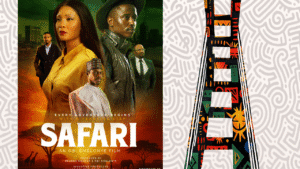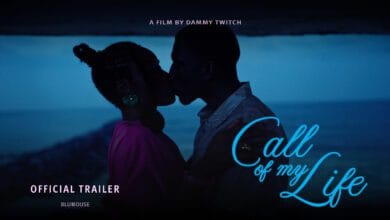The Story⚡
Obi Emelonye’s Safari is set to screen at Afriff 2025

Tell Me More
“Safari” follows a disenchanted wife of a Nigerian politician who becomes entangled with a local beach boy accused of murder during a Kenyan vacation. Eight years in the making, the pan-continental thriller was shot across Lagos, Abuja, Nairobi, and Mombasa, the pan-continental thriller stars Osas Ighodaro, Ali Nuhu, and Anthony Monjaro, with cinematography by Temitope Ajenifuja and screenplay by Tunde Babalola.
The film represents eight years of development by director Obi Emelonye and co-producer Reuben Odanga, showcasing Africa’s majestic landscapes while exploring themes of love, betrayal, and moral complexity.
Its AFRIFF 2025 debut introduces the project to international eyes, critics, and industry players before its November 21, 2025 theatrical release in Nigeria.
Key Background
For decades, African filmmakers couldn’t access proper financing. Banks demanded collateral creatives don’t have. Foreign investors took creative control. Personal savings limited ambition.
That’s changing. Afreximbank launched a $1 billion Africa Film Fund in 2025. Nigeria’s Central Bank established the ₦22.9 billion Creative Industry Financing Initiative in 2019. The Bank of Industry supports entertainment financing. But Providus Bank’s ₦5 billion Nollywood Fund introduced something different: a profit-sharing model where filmmakers keep 70% of profits after repayment, with 30% reinvested. No collateral. No creative interference.
Obi Emenloye’s Safari is the fund’s first public beneficiary. Eight years in development, shot across Lagos, Abuja, Nairobi, and Mombasa. World premiere at AFRIFF 2025. Theatrical release November 21, 2025.
What’s Actually at Stake
Safari is a stress test. Not just for one film, but for an entire financing model.
Here’s why it matters: Afreximbank has a billion dollars for African film. CIFI offers loans up to ₦500 million. But loans demand repayment regardless of box office performance. Providus Bank’s profit-sharing protects filmmakers from catastrophic debt if films underperform. It’s risk-sharing, not risk-transfer.
If “Safari” succeeds, Nigerian banks will compete for film portfolios. Governments will adopt profit-sharing over traditional loans. International investors will seek partnership instead of control.
If it fails, commercial banks may retreat. Filmmakers return to development bank loans with their collateral requirements and creative constraints.
The question isn’t whether African stories deserve financing. The question is whether commercial structures can sustain it profitably.
In Summary
Safari is a commercial proof-of-concept. If the film performs, profit-sharing becomes bankable. If it doesn’t, the industry could be back to collateral-based lending.
AFRIFF 2025 is the market test. Theatrical release on November 21 is the financial validation. Everything after depends on those numbers.

Thanks for Reading.
Shockng.com covers the big creators and players in the African film/TV industry and how they do business.
Let’s be friends on Instagram @Shockafrica



